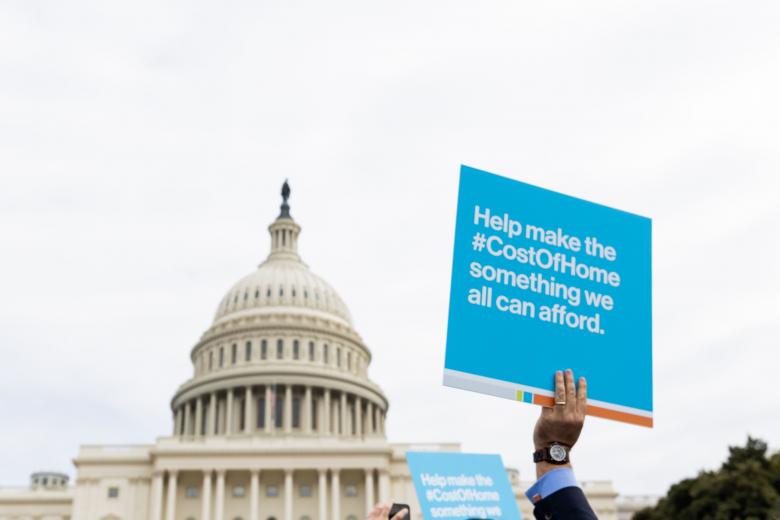Habitat for Humanity: From city hall to Congress, candidates must rise to the American housing affordability challenge
ATLANTA (Feb. 20, 2020) — Candidates for elected office up and down the 2020 ballot must talk about how they will solve the housing affordability challenges in their communities and our nation.
That’s the message Habitat for Humanity is taking forward as it expands its Cost of Home advocacy campaign across the country. The global nonprofit housing organization is also releasing its 10 federal policy priorities, just days after rallying supporters at the U.S. Capitol.

“The high cost of housing isn’t just an issue in big cities or on the coasts,” said Habitat for Humanity International CEO Jonathan Reckford. “More than 18 million families are spending half or more of their income on housing, and that’s true in cities, suburbs and rural areas alike. Even middle-class workers, like teachers and police officers, can scarcely find housing that fits their budgets.”
Since its launch in June 2019, more than 300 local Habitat organizations have joined the national Cost of Home campaign, which is committed to improving home affordability through policy and systems change. Habitat is looking to maintain that momentum in 2020 by engaging voters, candidates and elected officials at all levels of government through various events and activities that highlight affordable housing needs and the policies needed to address them.
“Last year Habitat for Humanity mobilized more than a million volunteers in the United States to lend their hands to build affordable homes,” Reckford added. “Now we’re calling on them to lend their voices to our movement by holding candidates and elected officials accountable to the housing needs in our communities.”
The campaign focuses on policy change at the local, state and national levels. Habitat’s federal policy agenda outlines a number of plans that, in concert with local and state advocacy efforts, will be instrumental in reaching the campaign’s goal of 10 million people with improved home affordability by streamlining access to safe and affordable homes across the housing continuum.
Among the policies highlighted in the agenda are:
- Expanding down payment and closing cost assistance to give low-wealth households a fair chance at homeownership;
- Creating 500,000 opportunity vouchers to help very low-income families access affordable homes in neighborhoods with opportunities; and
- Passing the Neighborhood Homes Investment Act, or NHIA, to rehabilitate homes in distressed communities.
NHIA has already gained significant traction. Earlier this month, more than 350 Habitat for Humanity leaders, volunteers, homeowners and housing affordability advocates rallied on Capitol Hill in support of the bill and other affordable housing measures. Sen. Ben Cardin, D-Md.; Rep. Mike Kelly, R-Pa.; and Rep. Brian Higgins, D-N.Y., spoke about NHIA and the impact it will have on communities nationwide at the event. The legislation would offer tax credits to attract private investment for rehabilitating homes for low- and middle-income homeowners, creating a pathway to neighborhood stability through sustainable homeownership.
Habitat encourages housing affordability advocates to join the effort by pledging to vote to make the cost of home affordable at www.habitat.org/costofhome/act-now.
About Habitat for Humanity
Driven by the vision that everyone needs a decent place to live, Habitat for Humanity began in 1976 as a grassroots effort on a community farm in southern Georgia. The Christian housing organization has since grown to become a leading global nonprofit working in local communities across all 50 states in the U.S. and in more than 70 countries. Families and individuals in need of a hand up partner with Habitat for Humanity to build or improve a place they can call home. Habitat homeowners help build their own homes alongside volunteers and pay an affordable mortgage. Through financial support, volunteering or adding a voice to support affordable housing, everyone can help families achieve the strength, stability and self-reliance they need to build better lives for themselves. Through shelter, we empower. To learn more, visit habitat.org.
